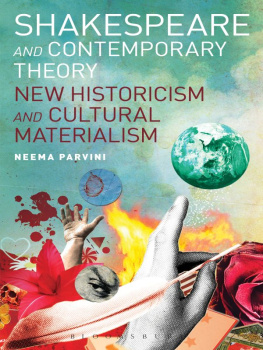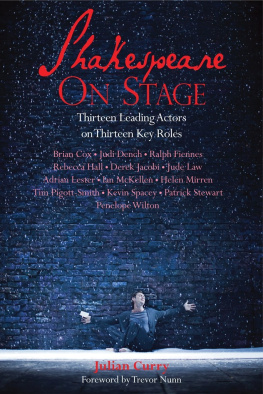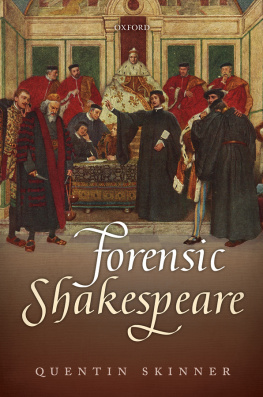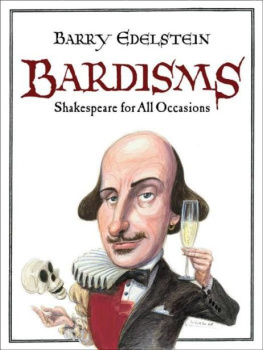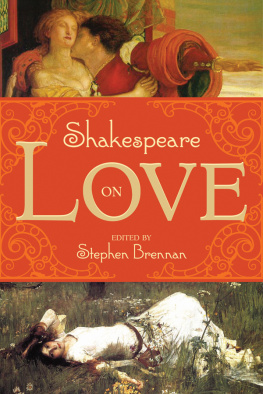Shakespeare William - Souls with longing: representations of honor and love in Shakespeare
Here you can read online Shakespeare William - Souls with longing: representations of honor and love in Shakespeare full text of the book (entire story) in english for free. Download pdf and epub, get meaning, cover and reviews about this ebook. City: Lanham;Md, year: 2011, publisher: Lexington Books, genre: Science. Description of the work, (preface) as well as reviews are available. Best literature library LitArk.com created for fans of good reading and offers a wide selection of genres:
Romance novel
Science fiction
Adventure
Detective
Science
History
Home and family
Prose
Art
Politics
Computer
Non-fiction
Religion
Business
Children
Humor
Choose a favorite category and find really read worthwhile books. Enjoy immersion in the world of imagination, feel the emotions of the characters or learn something new for yourself, make an fascinating discovery.

- Book:Souls with longing: representations of honor and love in Shakespeare
- Author:
- Publisher:Lexington Books
- Genre:
- Year:2011
- City:Lanham;Md
- Rating:3 / 5
- Favourites:Add to favourites
- Your mark:
- 60
- 1
- 2
- 3
- 4
- 5
Souls with longing: representations of honor and love in Shakespeare: summary, description and annotation
We offer to read an annotation, description, summary or preface (depends on what the author of the book "Souls with longing: representations of honor and love in Shakespeare" wrote himself). If you haven't found the necessary information about the book — write in the comments, we will try to find it.
Shakespeare William: author's other books
Who wrote Souls with longing: representations of honor and love in Shakespeare? Find out the surname, the name of the author of the book and a list of all author's works by series.
Souls with longing: representations of honor and love in Shakespeare — read online for free the complete book (whole text) full work
Below is the text of the book, divided by pages. System saving the place of the last page read, allows you to conveniently read the book "Souls with longing: representations of honor and love in Shakespeare" online for free, without having to search again every time where you left off. Put a bookmark, and you can go to the page where you finished reading at any time.
Font size:
Interval:
Bookmark:
John Alvis is professor of English and director of the American Studies Program at the University of Dallas, where he received his doctorate and has taught since 1969. His books include Shakespeares Understanding of Honor (1990) and Divine Purpose and Heroic Response in Homer and Virgil (1995). He is the coeditor of Shakespeare as Political Thinker (1979; revised, 2005) and Willmoore Kendall: Maverick of American Conservatism (2006), and the editor of Areopagitica and the Political Writings of John Milton (1998). He has published numerous articles and book chapters on Shakespeare, John Milton, Herman Melville, Caroline Gordon, Eugene ONeill, and American constitutionalism. His most recent book is on Nathaniel Hawthorne: Revolutionary Principles Personalized and Domesticated: Hawthorne as Political Philosopher (2011).
George Anastaplo is professor of law at Loyola University of Chicago, professor emeritus of political science and philosophy at Dominican University, and (for over fifty years) lecturer in the liberal arts at the University of Chicago. He has authored scores of book chapters, articles, and critical reviews, and his publications include more than fifteen books on constitutionalism, literature and the law, free speech, Abraham Lincoln, and political philosophy. He has published interpretations of almost all the works of Shakespeare, including in two law journals devoted exclusively to his writings: Prudence and Mortality in Shakespeares Tragedies (1979) and Law & Literature and Shakespeare: Explorations (2001).
Glenn Arbery has taught literature at the University of St. Thomas in Houston, Thomas More College in Merrimack, New Hampshire, and the University of Dallas. He has also served as director of the Teachers Academy at the Dallas Institute of Humanities and Culture and senior editor for People Newspapers in Dallas. The author of Why Literature Matters (2001), he has edited The Tragic Abyss (2003) and The Southern Critics: An Anthology (2010). Currently the dAlzon Chair of Liberal Education at Assumption College, he is working on two books: on the ontological criticism proposed by John Crowe Ransom, and on the literary fruits of the marriage of Allen Tate and Caroline Gordon.
John C. Briggs received his doctorate from the University of Chicago and is professor of English at the University of California, Riverside, where he received the 19951996 UCR Faculty Teaching Award. He teaches courses on American literature, Renaissance literature and Shakespeare, and on Lincoln and the history and theory of rhetoric and composition. His published articles and book chapters include studies of Shakespeares Romeo and Juliet , Timon of Athens , The Tempest and Macbeth . He is the author of Francis Bacon and the Rhetoric of Nature (1989), which won the Thomas J. Wilson Award, and Lincolns Speeches Reconsidered (2005), and is currently working on a book on Shakespearean catharsis.
Paul A. Cantor is Clifton Waller Barrett Professor of English at the University of Virginia. He is the author of Shakespeares Rome: Republic and Empire (1976) and the volume on Hamlet in the Cambridge Landmarks of World Literature series (1989; revised, 2004). He has published widely on the subject of politics, film, and literature, as well as on Shakespeare, including essays on The Merchant of Venice, King Lear, Othello, Macbeth, Henry V and The Tempest . His most recent book, coedited with Stephen Cox, is Literature and the Economics of Liberty: Spontaneous Order in Culture (2009).
Leon Harold Craig is professor emeritus at the University of Alberta, where for more than thirty years he taught graduate and undergraduate courses on Plato, Shakespeare, Hobbes, Rousseau and Nietzsche, as well as on the history and philosophy of science. The author of The War Lover: A Study of Platos Republic (1994), Of Philosophers and Kings: Political Philosophy in Shakespeares Macbeth and King Lear (2001), and most recently The Platonian Leviathan (2010), he has published numerous scholarly articles on political philosophy and is currently writing a second book on Shakespeare.
Scott F. Crider is associate professor of English at the University of Dallas, where he teaches a wide range of courses, but especially in Shakespeare studies and rhetorical studies. He is the author of two books, With What Persuasion: An Essay on Shakespeare and the Ethics of Rhetoric (2009) and The Office of Assertion: An Art of Rhetoric for the Academic Essay (2005), and has published articles, review essays, and reviews in a variety of journals, including American Catholic Philosophical Quarterly , Cithara , Modern Age , Studies in the Literary Imagination , The Ben Jonson Journal , and The Sixteenth Century Journal .
Bernard J. Dobski is associate professor of political science at Assumption College, where he teaches courses in international relations, American politics, and political philosophy, including a course on Shakespeares politics. He is the contributing coeditor of Shakespeare and the Body Politic (forthcoming). He has published articles on Mark Twain, Thucydides, and Xenophon in The Review of Politics, Interpretation , and Polis: The Journal for Ancient Greek Political Thought , as well as a book chapter on Thucydides and the Soul of Victory. His book reviews on American foreign policy and classical political thought have appeared in Society and The Review of Metaphysics.
Dustin A. Gish received his doctorate from the Institute of Philosophic Studies at the University of Dallas and, since 2007, has been visiting assistant professor of political science at College of the Holy Cross. He is the contributing coeditor of Shakespeare and the Body Politic (forthcoming) and The Political Thought of Xenophon (special issue of Polis , 2009), and has published book chapters as well as articles, review essays, and reviews on classical political philosophy (Homer, Xenophon, Plato) and American political thought (Jefferson) in The Journal of Politics, History of Political Thought , Polis: The Journal for Ancient Greek Political Thought , Perspectives on Political Science , The Review of Politics , and Bryn Mawr Classical Review .
Carson Holloway is associate professor of political science at the University of Nebraska at Omaha, where he teaches political philosophy, constitutional law, and American government. He has edited a collection of essays on Magnanimity and Statesmanship (2008) and has authored several books, including The Way of Life: John Paul II and the Challenge of Liberal Modernity (2008), The Right Darwin? Evolution, Religion, and the Future of Democracy (2006), and All Shook Up: Music, Passion and Politics (2001). He has published numerous scholarly articles, including Shakespeares Coriolanus and Aristotles Great-Souled Man in The Review of Politics (2007).
David Lowenthal is professor emeritus at Boston College, where he taught in the Political Science Department for more than thirty years. He has held the dAlzon Chair of Liberal Education at Assumption College and taught seminars on Shakespeare at College of the Holy Cross. He is the author of many scholarly articles as well as Shakespeare and the Good Life: Ethics and Politics in Dramatic Form (1997) and Present Dangers: Rediscovering the First Amendment (1997), a translation of Montesquieus Considerations on the Causes of the Greatness of the Romans and Their Decline (reprint, 1999), and most recently Abraham Lincolns Twenty Best Speeches: Texts and Interpretations (forthcoming).
Carol McNamara received her doctorate from Boston College in 1996, and is senior lecturer at Utah State University where she teaches courses on political philosophy, political theory and literature, and the American presidency. She is the author of several book chapters and articles, including Men and Money in Tom Wolfes America, The Pursuit of Happiness, American Style: Tom Wolfes Study of Status and Freedom ( Perspectives on Political Science ), and Socratic Politics in Xenophons Memorabilia ( Polis: The Journal for Ancient Greek Political Thought ). She is the contributing coeditor of The Obama Presidency in the Constitutional Order: A First Look (2011), and is currently writing A Political Companion to Tom Wolfe .
Font size:
Interval:
Bookmark:
Similar books «Souls with longing: representations of honor and love in Shakespeare»
Look at similar books to Souls with longing: representations of honor and love in Shakespeare. We have selected literature similar in name and meaning in the hope of providing readers with more options to find new, interesting, not yet read works.
Discussion, reviews of the book Souls with longing: representations of honor and love in Shakespeare and just readers' own opinions. Leave your comments, write what you think about the work, its meaning or the main characters. Specify what exactly you liked and what you didn't like, and why you think so.


